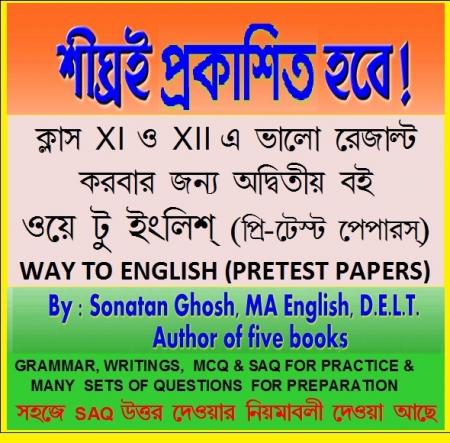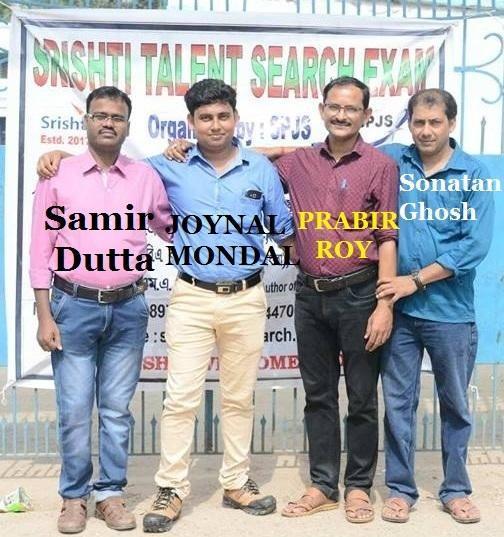FOR COMPETITIVE EXAMS
SET 1
Sentence Improvement
Directions : In each question below a part of the sentence is underlined. The part printed in underlined type may contain an error. Below each sentence four phrases are given which are numbered (a), (b), (c) and (d). One of these can substitute the part of the sentence in underlined type to correct it. The number of that part is the answer If the part of the sentence, which is printed in underlined type, is correct as it is, mark (e), i.e. ‘No correction required’ as your answer
1. He spent much time and energy over it, and lost a large sum in the bargain.
(a) with the bargain (b) for the bargain (c) off the bargain (d) to the bargain (e) No correction required
Ans. E
2. It is all and one to me whether he lives in Bombay or Calcutta.
(a) all but one (b) all one (c) one and all (d) all or one (e) No correction required
Ans. B
3. At an early age he had made his mark as a chemist.
(a) made his mark(b) makes his mark (c) has made his mark (d) has been making his mark (e) No correction required
Ans. A Explain : If the past time is mentioned in a sentence, the sentence must be in Simple Past tense. And verb should be past.
4. He is not in the good books of his master.
(a) in the better books (b) in the good book (c) in the best book (d) into the good books (e) No correction required
Ans. E
5. He has been working of and on for several years to compile a dictionary
(a) regularly (b) on and off (c) on or off (d) on and of (e) No correction required
Ans. B Explain : There are no meanings of ‘on or off’, ‘on and of’,’. The meaning of ‘off and on’ is ‘not regularly’.
6. Unless he does not leave this office, I will not say anything.
(a) had left (b) left (c) did not leave (d) leaves
(e) No correction required
Ans. D
Explain : Unless gives negative sense. So if unless is used in a sentence, there is no need of does not, do not, did not, no, cannot or could not to make the sentence negative. So ‘leaves’ is right as it is in the simple present tense and subject is third person singular number.
7. As the summer vacation approaches, the number of tourists are increasing by leaps and bounds.
(a) has increased by leaps and bounds (b) increases by leaps and bounds (c) are increased by leaps and bounds
(d) increased by leaps and bounds (e) No correction required
Ans. B
Explain : There is no sense of progressing. It indicates simple present. So verb must be in the present. Here the subject ‘the summer vacation’ is third person singular number. So …
8. It is one and a quarter hours since Priya went away.
(a) one and quarter (b) one and a quarter hour (c) one hours and quarter (d) one hour and a quarter (e) No correction required
Ans. D Explain : A quarter means 15 minutes. So using hours/hour after is not correct. So the answer ‘D’ is correct.
10. Where politics fails economics may sometime succeed.
(a) may sometimes succeed (b) may sometime succeeds (c) sometimes succeed (d) sometimes succeeds (e) No correction required
Ans. D
Explain : It indicates simple present tense. So verb should be present. Subject ‘Politics’ is third person singular number. So verb should be in the present. If the subject is third person singular number, s/es must be added to the verb. Sometime means ‘once’ and ‘sometimes’ means now and then. That is why ‘sometimes’ should be used here. (Politics, news etc are singular)
11. In which newspaper the advertisement appeared?
(a) did the advertisement appear (b) did the advertisement appeared (c) the advertisement was appeared (d) the advertisement appear (e) No correction required
Ans. A
Explain : To form a question, an auxiliary verb is generally used. So ‘did’ should be used here. If did is used, the verb should be present as did indicates past.
12. Suparna purchased the very good of all the Saris kept in the shop.
(a) the most good (b) the very better (c) the best (d) the better (e) No correction required
Ans. C
Explain : Before ‘of all’ superlative degree should be used. So the best should be used here.
13. Had we been on time, we would not have missed the train.
(a) had not (b) might have (c) would have been (d) will not have (e) No correction required
Ans. E



























































 This is a free homepage created with page4. Get your own on www.page4.com
This is a free homepage created with page4. Get your own on www.page4.com